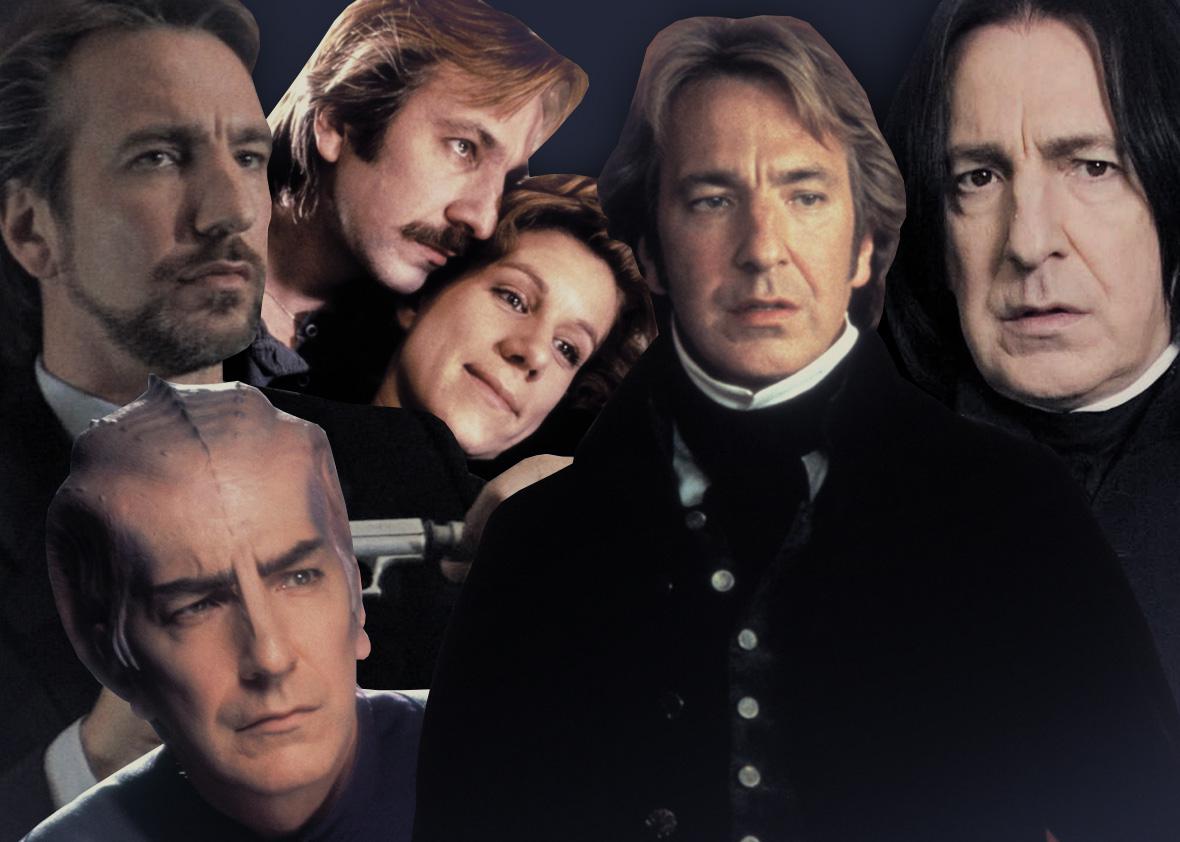Alan Rickman, the British actor who died Thursday at 69, had poise and charisma and charm. Most memorably, he had that voice. Mellifluous, dangerous, nearly tactile, his purr was a kind of instrument he could play with a maestro’s skill. He used it to menace cartoonishly, to dismiss witheringly, to seduce voluptuously. It was the tool of a classically trained actor, a star student at the Royal Academy of Dramatic Arts, who spent a decade playing big onstage before he embarked on a film career during which, unlike many stage-turned-film actors, he got to play just as big onscreen.
The floridity he could deliver on demand served him particularly well in a trio of villainous roles early in his career, which defined him for a generation of theater- and filmgoers. As Valmont in Les Liaisons Dangereuses in London and on Broadway, as Hans Gruber in Die Hard, as the Sheriff of Nottingham in Robin Hood: Prince of Thieves, Rickman was both menacing and funny, dangerous and absurd. (OK, the Sheriff of Nottingham tilted that balance waaaaay to the absurd.) But even in those movies Rickman knew when to dial back. Rewatch the classic sequence in Die Hard in which John McClane meets Gruber near the roof of Nakatomi Plaza and Gruber feigns hostagehood: It’s a master class in underplaying, Rickman hitting perfect regular-Joe notes—“I spent a weekend at a combat camp. You know those guns that shoot red paint?”—before turning the tables.
Rickman played the disparity between the theatrical and the commonplace for laughs in several of his movies, never better than in the fantastic 1999 comedy Galaxy Quest. As Alexander Dane, the Shakespearean thespian forced by the vagaries of commerce to spend his career wearing stupid prosthetics from the Star Trek-style sci-fi show that made his name, Rickman tweaks his own image while also delivering a complete, complex portrait of a man at first disappointed by his own choices and then overwhelmed by his own heroism. By Grabthar’s Hammer, what a performance!
But there are two Rickman roles that I’m thinking about today that didn’t require him to chew the scenery, in which he played that instrument of his mostly in its lower registers. They’re the soulful roles that made me love him as a performer: Jamie, the maybe-a-ghost in 1991’s Truly, Madly, Deeply, and the honorable, decent Colonel Brandon in 1995’s Sense and Sensibility. In the former, writer-director Anthony Minghella placed Rickman in a difficult position, playing an abstraction of sorts—Juliet Stevenson’s idealized memory of her late boyfriend, then the curdling of that idealization. But Rickman is ideal as the object of desire, puckish as a kind of loving poltergeist, and just sad enough to make us miss him, too. (The quick glance he gives out the window at the sky in this clip, just before Rickman and Stevenson’s much-loved manic duet to “The Sun Ain’t Gonna Shine Anymore,” kills me every time.)
And in Sense and Sensibility, part of Rickman’s fruitful creative partnership (but only creative, as they liked to joke) with Emma Thompson, Rickman ceded the role of the rake Willoughby—the one he might well have devoured—to another actor, and instead played the melancholy and true Colonel Brandon, whom Marianne (Kate Winslet) dismisses at first but comes to love. Thompson’s wonderful diaries of the shoot include several terrific moments of Rickman being arch and hilarious, including a memorable “Fuck you” delivered to an innkeeper’s cat—but they also reveal Thompson’s affection and respect for her friend, which, I think, plays in the movie as well and made me love Rickman all the more:
Alan was very moving. He’s played Machiavellian types so effectively that it’s a thrill to see him expose the extraordinary sweetness in his nature. Sad, vulnerable but weighty presence. Brandon is, I suppose, the real hero of this piece but he has to grow on the audience as he grows on Marianne.
Younger audiences know Rickman best as Severus Snape, the cruel potions master in all eight Harry Potter movies. He is, of course, perfect in the role, sneering and drawling and J.K. Rowling his way through every delicious scene he can get his hands on. (What other actor could make “Turn to page three hundred and ninety-four” a laugh line?) But I remember, just before the final book came out, when a great debate raged among readers as to whether Snape would be finally revealed as good or evil. Through it all, I was steadfast in my belief that Snape was, at center, a tragic hero. That assurance wasn’t based, really, on any clues from the text. It was based solely on the fact that, long ago, the film’s producers—with Rowling’s presumed assent—had cast Alan Rickman in the role. You’d never do that, I was certain, if the character wasn’t meant to break our hearts.
